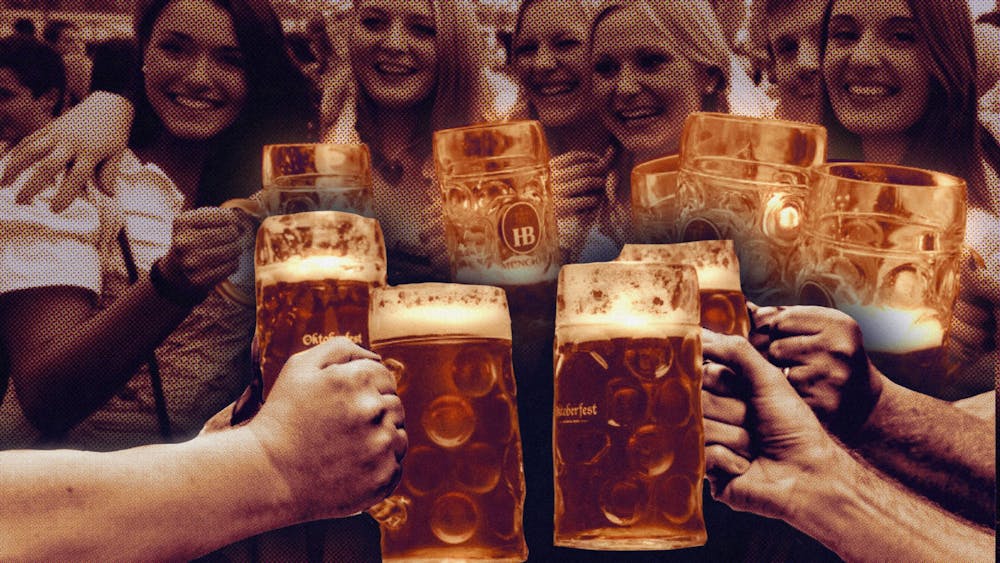As September draws to a close, an exciting buzz permeates Philly’s air. But it’s not the usual energy: the rowdy Eagles fans are joined by German lager–drinkers and curry–wurst eaters. Wafts of sauerkraut and sizzling bratwurst replace fried onions and skirt steak. As evidenced by the crowds dressed in dirndls and lederhosen, Oktoberfest, one of Germany’s most coveted events, has made its way to Philly.
Oktoberfest, which runs from mid–September to early October, is an annual Bavarian festival that originated in Munich, Germany. The origins of Oktoberfest lie in the afterparty of a royal wedding in 1810. Princess Therese of Saxe–Hildburghausen and Crown Prince Ludwig of Bavaria, two who would soon come to be the king and queen of Bavaria, commemorated their marriage with an effervescent celebration. It was so esteemed that it returned the next year, and 186 more years after that.
“Coming from Munich, it’s by far the biggest event of the year,” says August Waldburg, Masters student at Penn. Waldburg reflected on a number of traditions vital to maintaining the festival’s authenticity: The mayor taps the first keg with a hammer until it has been successfully opened in the smallest number of hits possible. A gun is then fired into the air to notion to the other tents that the time to start selling their beer has come. The original six breweries provide the beer, with each tent selling one of the six variations.
Since then, Oktoberfest has come to be an extravagant beer and folk festival, as well as a defining aspect of German culture that permeates Philly. Celebrations range from the South Street festival that shuts down a city block to OktoBEARfest at the Philadelphia Zoo, featuring pumas, penguins and unlimited samples of over 100 craft beers and ciders.
On September 16, Brauhaus Schmitz, an authentic German beer hall and restaurant based in Philadelphia, put on their 15th annual South Street Oktoberfest. “They do a great job with it and I think it’s a great addition to the diversity of culinary and cultural events that can be found in Philly,” says Ursula Rieker, German immigrant and local Philly business owner of Rieker's Prime Meats.
From noon to 8 pm, the block was filled with dancing, traditional cuisine, face painting, and the liter lifter competition, where competitors fight to keep their outstretched arms, holding a liter of beer, up the longest. Though Waldburg, who attended with the Penn German Society, claims that “the food was nowhere near what it is in Germany,” the beer they were selling was genuine Bavarian beer. One of the options was especially near and dear to him, as it came from a friend’s brewery back home.
With traditional Bavarian dancers accompanied by live music from Die Heimatklänge, the Brauhaus Schmitz Oktoberfest is here to foster a lasting impact on the cultural enclaves that contribute to Philly’s diversity. It has come to be a day for the German community in Philadelphia to uphold tradition and connect with culturally similar locals.
Many are surprised to know that Pennsylvania has the largest German population in the entirety of the United States. What does this mean? An increasingly ubiquitous effort to welcome the omnipresence of the German–Philadelphian experience. At first glance, the Brauhaus Schmitz Oktoberfest is a day of drinking, singing, and partying, but it holds significantly larger impacts for the greater Philadelphia community.
“There are small traces of Germany everywhere,” says Waldburg, “which I think is pretty cool”.
Beyond Brauhaus Schmitz, there are a number of local businesses that have made a name for themselves. As previously mentioned, Ursula Rieker is a German immigrant from Baden Württemberg who came to Philly after marrying her husband, Walter, in 1969. Taking over Walter’s uncle’s Northeast Philly butcher shop in ‘72 was the start of their journey to introducing German culture to Philly.
Rieker says that especially during Christmastime, the store sells German sweets and baked goods that are unfamiliar to Americans. She reflects that it is “so much fun” for her to introduce them to the customers. For her family, coming to the U.S. from Germany has allowed them to live out the American dream, and choosing Philly specifically let them “balance [their] heritage and [their] loyalty to [their] adopted country really well.” Rieker is a testament to the “melting pot” that is Philadelphia.
It’s easy to enjoy an event like this at surface-level, but it’s much more meaningful to understand the origins. The next time you’re listening to German music or enjoying a German lager, hopefully you’re daydreaming of the celebration that is Oktoberfest … and if you can’t make it to Munich, apparently Philadelphia is the next best thing. Dankeschön, Philly, for being the center of cultural appreciation, and for upholding our customs and traditions.

